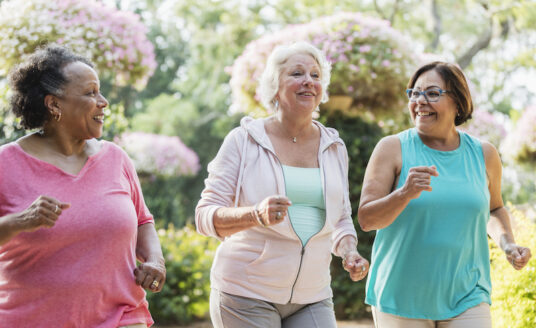Cold weather can play tricks on our bodies. When the weather is hot, our body sends us thirst signals, so our need to stay hydrated is obvious – but, during the winter months, drier air can cause us to dehydrate (even though we don’t feel thirsty).
Researchers say that seniors especially should drink more water to compensate for changes in their bodies. Fortunately, there are some warm beverages available that are both delicious and nutritious – making it easy for seniors to consume plenty of fluids during the winter months. The following winter hydration tips and recipes can help seniors navigate the cold weather season.
Winter Hydration Tips and Benefits
Consuming a sufficient quantity of fluids has many health benefits, including:
- Maintaining physical energy and brain function
- Helping to prevent and treat headaches
- Reducing muscle pain
- Relieving constipation
- Maintaining skin quality
- Aiding in weight loss
Dehydration in senior adults can result in acute kidney failure and electrolyte imbalances, both of which can be extremely harmful. In addition, the amount of fluid in our body begins to decrease as we age, and therefore we have fewer water reserves to draw upon.
How Much Should You Drink?
The old rule of eight 8-ounce glasses of water per day has no basis in science. The quantity of fluids a person should consume is determined by a number of factors:
- Body weight
- Age
- Medications
- Fitness and activity levels
There are charts to calculate the appropriate daily water intake, but it may be best to consult your physician, who can help you identify your unique fluid needs and give you more hydration tips.
5 Warm Beverages for Winter Hydration
1. HOT LEMON WATER
Water is still the best hydrator because it is the simplest and, therefore, easiest fluid for the body to process. Adding a twist of lemon adds flavor and some vitamin C. The steam from the water held close to the face may help loosen clogged sinuses, and the water aids digestion as well as hydration.
2. HERBAL TEA
Switch your regular tea to herbal teas. These can be prepared at home and will not contribute to overconsumption of caffeine. There are plenty of herbal teas available, including:
- Chamomile tea has been used in herbal remedies for thousands of years. Known for its anti-inflammatory benefits, it is considered a soothing tea blend and, if taken just before bedtime, it may promote digestive health and play a role in lowering blood sugar.
- Ginger tea has been used to settle the stomach, and research has shown it can protect against heart disease and help control blood sugar.
- Green tea is extremely popular, containing a wide array of antioxidants to protect the body from damage and boost the immune system.
- Lemongrass tea has a bright, comforting flavor that may reduce some forms of anxiety. It also has antioxidant and anti-inflammatory properties.
3. COFFEE
Coffee gets a “bad rap” because drinking more than one cup in a day has not traditionally been recommended, but studies show that drinking black coffee has many health benefits. It is naturally rich in many nutrients and high in antioxidants. The caffeine in coffee provides a short-term brain boost and, according to some studies, lowers the risk of developing Alzheimer’s disease. Coffee drinkers have also demonstrated a reduced risk for developing Type 2 diabetes. Try to enjoy this beverage in moderation (limit to 1-2 cups a day) or opt for decaf coffee to reduce your risk of overconsumption of caffeine.
4. WARM APPLE CIDER WITH CINNAMON
For many, apples are a staple of the fall and winter months – and there is nothing like a glass of sweet, warm apple cider to simultaneously quench your thirst and satisfy your sweet tooth. Apple cider is a great source of vitamin C and iron, which help with tissue repair and boosting the immune system. Cinnamon is loaded with antioxidants, has anti-inflammatory properties, and tends to lower blood sugar. This is a great warm beverage for someone seeking healthy winter hydration and flavor.
5. HOT COCOA
Great news for chocolate lovers! Dark chocolate has been shown to lower blood pressure and increase serotonin levels, which usually results in a calming, soothing effect. And cocoa contains powerful antioxidants that reduce inflammation. The key is to look for cocoa mixes that list dark chocolate as their first ingredient (at least 70 percent cocoa). To make your hot cocoa a little healthier, make it with low-fat milk and drink it in moderation.
Warm Drink Recipes
While these recipes for winter-themed warm beverages are considered healthier options, please observe any dietary restrictions you may have.
WARM SPICED APPLE JUICE PUNCH
Ingredients:
- 4 cups unsweetened apple juice
- 2-1/4 cups water
- 1 can (6 ounces) frozen orange juice concentrate, thawed
- ¾ tsp ground nutmeg
- ¾ tsp ground ginger
- 3 whole cloves
- 2 cinnamon sticks
Directions:
In a 3-qt. slow cooker, combine the apple juice, water, orange juice concentrate, nutmeg and ginger. Place cloves and cinnamon sticks on a double thickness of cheesecloth; bring up corners of cloth and tie with string to form a bag. Place bag in slow cooker.
Cover and cook on low for 4-5 hours or until heated through. Remove and discard spice bag.
Note: A ¾ cup serving contains: 94 calories, 0g fat (0g saturated fat) 0mg cholesterol, 14 mg sodium, 23 grams carbohydrate, 1 gram protein.
NO-SUGAR-ADDED MINTY HOT COCOA
Ingredients:
- 2 tsp unsweetened cocoa powder
- 1-2 packets of Splenda sweetener
- Dash of salt
- 1 cup 1% milk
- ½ tsp vanilla extract
- ½ tsp peppermint extract
Directions:
Mix cocoa, Splenda, and salt in a large mug. Heat milk in microwave for 1-1/2 minutes, until hot. Gradually add hot milk to cocoa mixture in mug, stirring until well blended. Stir in vanilla and peppermint. Yields one serving.
Want to find out more?
If you’d like to stay up to date with Bethesda Health Group, sign up here to receive our blog and newsletters!
"*" indicates required fields
Related Articles
Want to find out more?
If you’d like to stay up to date with Bethesda Health Group, sign up here to receive our blog and newsletters!
"*" indicates required fields



